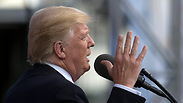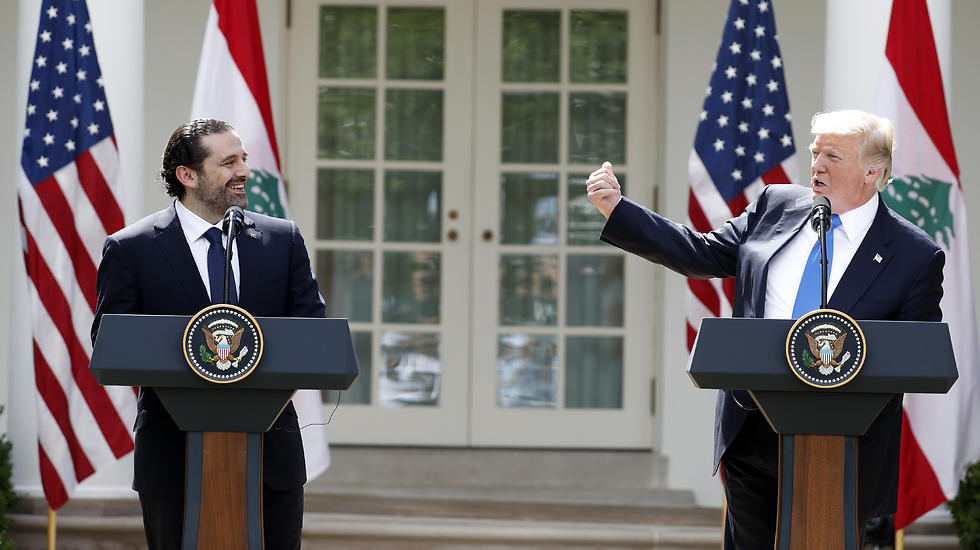

Trump’s Mideast peace deal is fading away
Op-ed: These days, the US president is mostly worried about the black Russian cloud hanging over Washington. As far as he’s concerned, the Middle East can wait. The man who announced with great fanfare that he is the only person who can bring a peace agreement to the region has no idea who’s fighting whom in this neighborhood.
Because Donald Trump, it turns out, has no clue about Hezbollah. The man who announced with great fanfare that he is the only person who can bring a peace agreement to the Middle East has no idea who’s fighting whom in the neighborhood.
On Tuesday, Trump told the nation that Lebanon was on the frontlines in the fight against the Islamic State, al-Qaeda and Hezbollah. Yes, Hezbollah. As usual, he didn’t do his homework, and didn’t know that Hezbollah is part of Lebanon and its politics. It’s therefore no wonder that Lebanese Prime Minister Saad Hariri, who was standing next to him, wiggled with discomfort.

Trump added that within 24 hours, after consulting his military experts, he would make his position on sanctions against Hezbollah clear. And this is the man who promised Israel and the Palestinians the moon upon taking office. He would show everyone that he can bring, with his real estate skills, what former president Barack Obama wanted so much and failed to deliver: An end to the conflict.
When the White House was filled with chaos on the first days of his term, it seemed there was only one issue the president and his advisors were and focusing and working on in full force: Making peace between Israel and the Palestinians. And not only that, but as part of a regional agreement that would include Saudi Arabia and other Sunni states in the region. The drafts for the American initiative exchanged hands, and the aspiration was to advance the two-state solution, with clear borders and land swaps—a variation of the Saudi initiative that turned into the Arab initiative, and the only solution on the ground, if the parties really want it.
And Trump really wanted it. His associates began fantasizing about hosting a conference, which would eventually lead to a Nobel Prize. The grandiose plan even managed to instill hope in the Palestinian side, which rushed to praise the new president. But high expectations lead to disappointment: The Trump-led White House started to considerably withdraw, and the passion for the issue was replaced with indifference.
Now, the US is just strengthening its relations with the parties, serving as a fire extinguishing force—for example, by curbing the escalation around the Temple Mount—rather than serving as an initiating force advancing an agreement. The special envoys, Jared Kushner and Jason Greenblatt, are mediating between Amman and Jerusalem to prevent an intifada. No one there expects more than that. Perhaps for the first time, or at least in a very long time, the White House issued no condemnation of a serious terror attack, like the one which took place in Halamish. It wasn’t even on their agenda.
Trump and his heroes are tired, and they no longer see the Middle East as a promise but rather as a milestone. The president declared that there was only one person who could carry out such a deal: His son-in-law and senior advisor Jared Kushner. The son-in-law, however, is busy proving that he wasn’t involved in a plot with Russia during the election campaign. Trump himself is busy insulting his attorney general, Jeff Sessions, trying to make him quit, and getting rid of special counsellor Robert Mueller, who is looking into his ties and his people’s ties with Russia. He isn’t firing Sessions because his electoral base wants to see him in that position.
Trump is mostly concerned these days with the black Russian cloud hanging over Washington. As far as he’s concerned, our region can wait. But in these troubled times, from the pools of blood and bursting rage on the mountain, the president could have actually created a different drama and launched a resonating American call to stop the violence and return to the negotiating table. Something like shock therapy, an American statement with a timetable and real teeth, like a world power should do at a time of crisis. It seems, however, that the Middle East has never been so far from the White House. Or maybe Trump thinks that things are not bad enough there to allow him to bring something good.
















